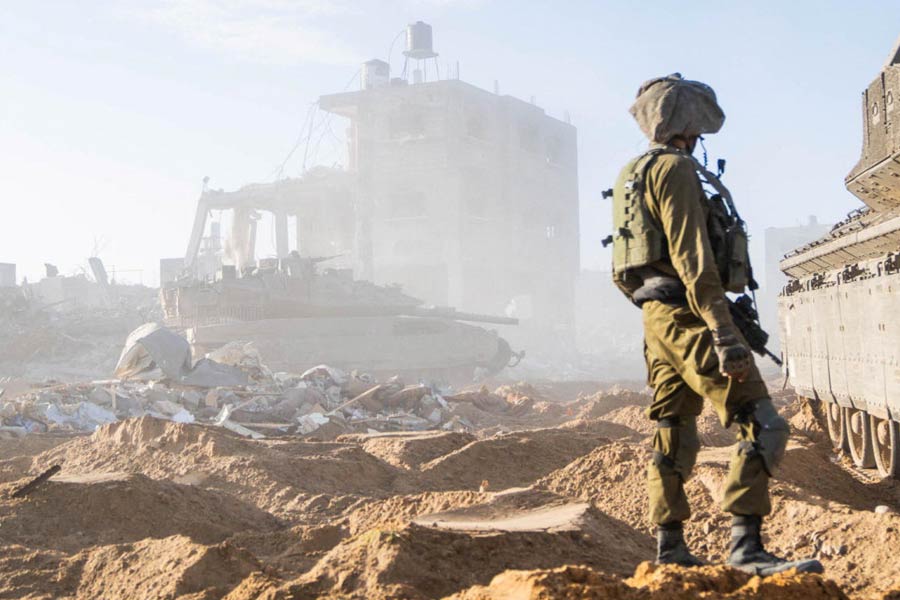Daubed in red paint on a fallen wall, the names Omar, Abdullah and Massa mark the spot where the three children were buried alive by an Israeli air strike in the Gaza Strip in November, their relatives say.
Mohammad Abu Aweidah, an uncle of the missing children, said he visits the rubble of the home in Rafah every day in the "hope one can pull out their bodies, or take a last look at their remains".
"We pray to God that we will be able to pull them out and see them," said Abu Aweidah. They were among 16 children killed in the strike that day, one of them his 18-month-old son, whose body was recovered, he said.
The three children are among thousands of Palestinians whom authorities in Hamas-run Gaza say remain missing after 100 days of war, indicating the casualty toll could be well above the nearly 24,000 deaths recorded by health authorities in Gaza.
The war, which began on October 7 when Hamas fighters stormed Israel, killing 1,200 people and abducting 240 more, according to Israeli tallies, has been the deadliest in decades of conflict between Israel and the Palestinians.
Health authorities in Gaza have estimated that about 40 per cent of those confirmed killed are aged under 18.
Abu Aweidah said his son had been "martyred in his sleep" after he'd put him to bed, asking what the infant had done to deserve such a fate.
The ground was covered in chunks of masonry and twisted metal as he visited with his young daughter.
"We have nothing left, the house is all gone, that was my father's labour, he spent 40-50 years building it and it vanished in a second, all of it, became a memory, became history, without prior notice," he said.
Nearly the entire population of Gaza — 2.3 million people — have been forced to flee their homes during the Israeli offensive, which has laid waste to the territory.
Khaled Abu Aweidah, another relative, said his son Ihab and six grandchildren were among the family members killed in the strike. Two of those grandchildren — Abdullah and Massa — were among the three children still missing, he said.
"We long to get those three children out from under the rubble and bury them like human beings," he said.
Ziad Mansour, a neighbour, recalled how he used to watch from his balcony as the Abu Aweidah children played. "In a blink of an eye, they vanished," he said. "They come here every day... in hope that they can pull them out and bury them, knowing very well that they are with God."
Mohammad al-Mughair of the Gaza Civil Defence said residents were calling in to appeal for help to get children out from under the rubble, including from areas in northern Gaza that have been too dangerous to reach due to military operations.
He said rescue workers faced difficulties including the psychological impact of recovering bodies, especially "people who have been under the rubble for more than two months".
"Moreover, we suffer from the limited resources, especially with the malfunction of the machines and bulldozers."
One hundred days after the war, Gaza lies in ruins and West Asia is sliding towards a wider, more unpredictable conflict.
For both Israelis and Palestinians, the war has been a trauma that looks likely to last for years, deepening the hostility and mistrust that have stood in the way of peace for more than 75 years.
"No one will win," said Rebecca Brindza, a spokesperson for families of the 240 Israelis and foreigners seized as hostages during the attack on communities around the Gaza Strip that opened the war.
The assault in the early morning hours caught Israel's vaunted military and security services completely off guard, opening days of fear and uncertainty for the country as the details of the slaughter by the rampaging gunmen emerged.
The attack killed more than 1,200 people, the biggest single-day loss of life since the founding of the state of Israel in 1948, and the shock was compounded by the multiple accounts of rape and sexual violence that emerged in the following weeks.
The Israeli response was immediate and unrelenting, beginning with a systematic aerial bombardment and followed by a ground invasion that together laid waste to Gaza and forced almost 2 million people to flee their homes.
Three months on, Israeli troops are still battling Hamas Islamist militants in the ruins of Gaza and hunting architects of the October attack, such as Yahya Sinwar, the Hamas leader in Gaza and Mohammed Deif, the movement's military leader.
Most of the enclave's hospitals have been destroyed, hunger is a growing threat and a dire humanitarian crisis threatens to end up killing even more Gazans than the Israeli military.
In a statement marking the 100 days, the Palestinian ministry of foreign affairs accused Israel of creating "a circle of death" in Gaza.
Netanyahu, whose political future will depend on the outcome of the war, has shown no sign that he was listening to the growing calls for an end to the fighting.
"We are continuing the war until the end — until total victory," he said on Saturday at a news conference to mark the 100 days of the war.











